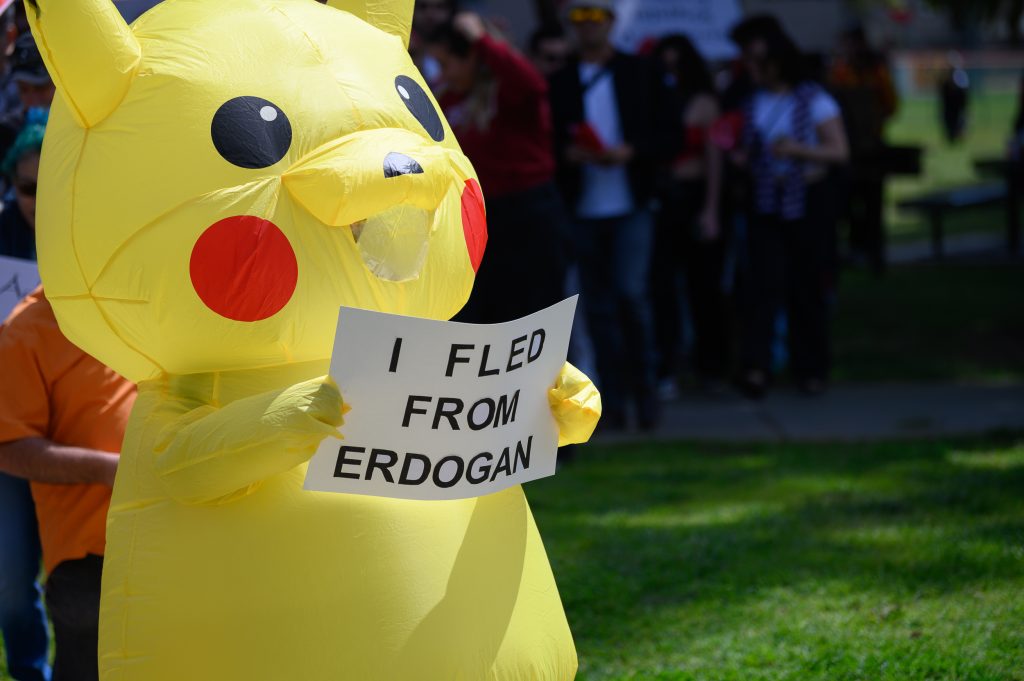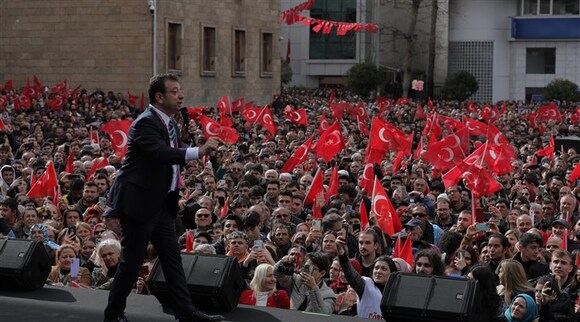
Democracy on the Run: Why a Man in a Pikachu Costume Fleeing Turkish Police Is More Than a Meme
On March 19, 2025, Istanbul Mayor Ekrem İmamoğlu—one of the most popular opposition figures in Türkiye—was arrested and jailed under what many believe to be trumped-up charges. A day earlier, his university diploma was retroactively invalidated so that he could not run for president. In order to qualify to run for Turkish president all candidates must hold college degrees. These events sparked immediate protests in Istanbul and other Turkish cities, quickly spreading to Turkish diaspora communities around the world.
At one protest, a young demonstrator dressed in a Pikachu costume was videotaped running from riot police. The image went viral, crystallizing the absurdity and urgency of Türkiye’s democratic backsliding into a single, surreal moment. To understand why this image resonated so widely—and why İmamoğlu’s arrest is so significant—it’s important to zoom out and look at the larger picture of Turkish politics over the past two decades.
Erdoğan’s Long Shadow
Since 2003, Recep Tayyip Erdoğan has ruled Türkiye, first as Prime Minister and then as President. His party, the AKP (Justice and Development Party), rose to power promising moderate Islamism, economic growth, and democratic reforms. But over the years, Erdoğan has centralized power to an extraordinary degree, silenced critical media, jailed political opponents, and reshaped the judiciary to serve his agenda. In 2017, he pushed through a controversial constitutional referendum that dramatically expanded presidential powers—narrowly winning after widespread accusations of electoral fraud.
This authoritarian turn has been gradual but relentless. Türkiye is now ranked “Not Free” by Freedom House, and Reporters Without Borders calls it “the world’s biggest jailer of journalists.” Still, despite state repression and a heavily tilted playing field, opposition parties continue to win key local elections—especially in Turkey’s major cities.
Who Is Ekrem İmamoğlu?
Ekrem İmamoğlu rose to national prominence in 2019 when he ran as the opposition candidate for Istanbul’s mayor. His initial victory over Erdoğan’s chosen candidate was annulled after alleged irregularities—a decision widely condemned as politically motivated. But in a powerful rebuke, İmamoğlu won the re-run by an even larger margin. He was re-elected as the mayor of Istanbul in 2024.

İmamoğlu’s ability to appeal across Türkiye’s polarized political spectrum, combined with his charisma and relative youth, made him a natural rival to Erdoğan. İmamoğlu is widely seen as a strong potential presidential candidate. In response, the government intensified pressure: İmamoğlu was convicted of “insulting public officials” over a minor remark and banned from politics (a decision still under appeal). Then, in March 2025, he was arrested and his university diploma was annulled—raising concerns that the government was stripping his eligibility for office. Many view these actions as blatant attempts to eliminate Erdoğan’s political opponents, which only adds to İmamoğlu’s appeal.
Recep Tayyip Erdoğan himself served as the Mayor of Istanbul from 1994 to 1998. In 1998, he was arrested and banned from politics for reciting a poem that likened mosques to barracks and the faithful to an army. His imprisonment contributed to Erdoğan’s popularity early in his career. After his release from prison in 1999, he founded the Justice and Development Party (AKP) and was elected Prime Minister in 2002. Today, it is striking—and deeply ironic—that Erdoğan is using similar tactics against Istanbul’s current mayor, Ekrem İmamoğlu. Rather than weakening him, these moves have increased İmamoğlu’s popularity.
Youth at the Forefront
What followed İmamoğlu’s arrest was a wave of protests, many led by young people. The outrage wasn’t limited to political activists. University students, artists, and ordinary citizens took to the streets. Their slogans weren’t just about İmamoğlu—they were about rule of law, civic dignity, having so little hope that they have not much to lose and the desire for a future without fear.
As Erdoğan has been in power since 2002, this generation entirely grew up during his reign. They’ve seen the internet censored, LGBT+ communities targeted, and opposition crushed. But they’ve also come of age in a globally connected world, where digital culture, memes, and solidarity movements cross borders. Their protests blended serious demands with absurdist humor—a powerful coping mechanism and a savvy media tactic. Which brings us to Pikachu.
Why a Cartoon Character Became a Protest Icon.
At a protest in Antalya, a man in a full Pikachu costume ran from the police as officers charged at demonstrators. Someone took a video. The image exploded online.
Pikachu—naïve, lovable, and utterly out of place in a political crackdown—became a metaphor. The Pikachu moment echoed past youth uprisings around the world, from Hong Kong’s umbrellas to Tahrir Square’s graffiti. It combined humor with heartbreak, underscoring the surreal nature of protesting a regime that treats electoral opponents as enemies of the state.
Why It Matters
İmamoğlu’s imprisonment and the targeting of his diploma are not isolated incidents. They are part of a larger pattern in which Erdoğan and his allies use courts, police, and bureaucracy to sideline rivals. Several other opposition leaders, including Kurdish politician Selahattin Demirtaş and nationalist figure Ümit Özdağ, are also in jail or facing charges.
What’s unfolding in Turkey is a slow-motion dismantling of democracy through legal means—a “soft coup” strategy that weaponizes institutions against dissent. And as elections draw nearer, many fear that Erdoğan will stop at nothing to retain power.
The protests offer a different vision: one of cross-generational resistance, creativity, and courage. Whether led by young artists, exiled journalists, or people in Pokémon costumes, they represent a yearning for transparency, fairness, and democratic renewal.
A Global Echo
The diaspora has responded too. Protests erupted in Berlin, Toronto, Sydney, New York, Los Angeles and much more—where Turkish diaspora and their allies gathered in front of consulates and city centers holding signs that read “Democracy Under Arrest” and “We Are All İmamoğlu.” These actions may not shift Turkish policy directly, but they help raise international awareness and put pressure on Western governments to address Erdoğan’s slide into authoritarianism.
In a global era where images travel faster than policy, a single protest photo—whether raw or ridiculous—can be enough to make people pause, ask questions, and pay attention. Sometimes, the image that breaks through isn’t a politician behind a podium, but a Pikachu running for its life.
Because sometimes, that’s what democracy looks like: bright, absurd, and on the run.
Comments are closed.